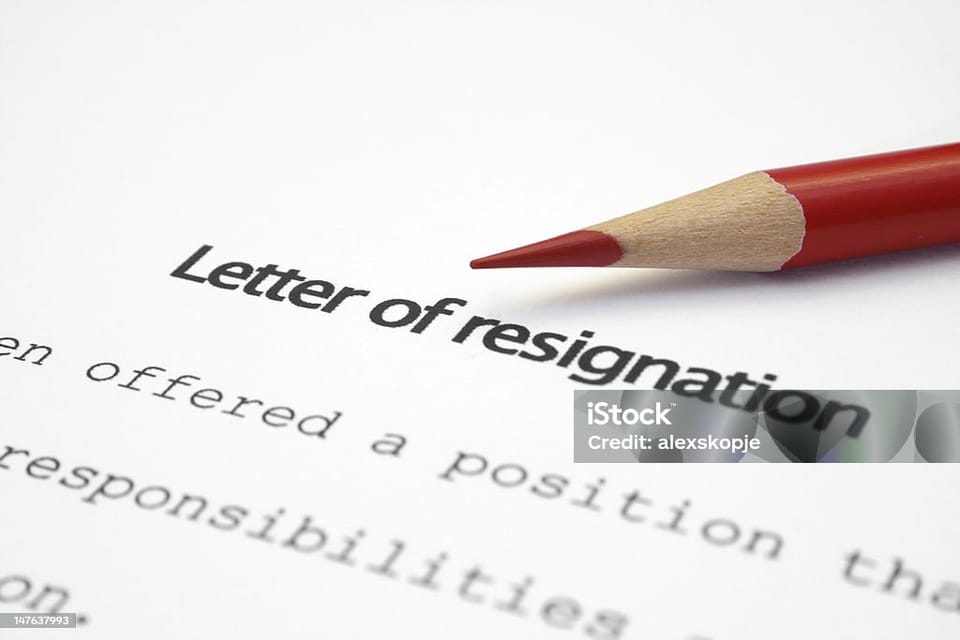Resignation Letter Templates: How to Write a Respectful Resignation Letter

Resigning from a job is a significant step in your professional journey, but writing a resignation letter respectfully and professionally is equally essential. Whether you are leaving for another opportunity, further education, dealing with personal problems, or taking a break, resigning from your current position on good terms is essential. This helps you maintain a positive relationship with your employer and coworkers. Also, it can lead to suitable references and job opportunities in the future. A well-crafted resignation letter serves as a record of the employee’s departure. It also provides a platform to express your gratitude to ensure a smooth transition out of your role. In this blog post, we will walk you through the process of writing a respectful resignation letter, along with tips and templates. So, let’s get started!
What is a Resignation Letter?
A resignation letter is a formal document that informs your decision to leave your current job. It's important to submit your resignation letter in advance, adhering to the company's notice period policy. Failure to do so may affect your professional reputation and future job opportunities. A resignation letter can be submitted directly to the manager via email or in printed form.
This letter provides details of your final working day. It’s a professional way to communicate your departure from the company, which ensures a smooth transition.
Read How to Know When It's Time to Resign
The Importance of Well-crafted Resignation Letters
A compelling and well-crafted resignation letter is crucial for the following reasons:
Professionalism
It shows your professionalism and respect for the company, even as you leave it.
Documentation
It is an official record of your decision to resign from the company, which will add an essential document to the HR file.
Positive Exit
A well-written letter helps you leave on good terms, which can be useful for job references in the future.
Know How to Gracefully Resign from your Job
Clarity
It provides transparent information about your departure from the job and helps to ensure a smooth handover of your duties.
Key Elements of a Professional Resignation Letter
While creating your resignation letter, it’s essential to add the following details:
Date and Recipient Information
Begin your resignation letter by putting the current date at the top. Next, add the recipient's name and job title. Address them with “ Dear Manager or Supervisor, " and write the company address below.
Statement of Resignation
Mention that you are resigning from your position. For example, “ I am resigning from my position as ( your job title). Be direct and concise in your statement. This makes your decision clear and reflects professionalism.
Last Working Day
Mention your last day of work. When you resign from the job, make sure to serve the notice period. This gives your employer time to prepare for your departure and shows your respect towards their policies.
Reason for Leaving (optional)
You can provide a brief reason for your resignation, but this is optional. If you do, keep it positive and professional. For example, you might say you are moving to a new city or want to grow in your career and learn new opportunities.
Expression of Gratitude
Express your gratitude for the opportunities and positive experiences you had with the company and mention things you enjoyed while working there. This helps leave a good impression and shows you value your time at the company.
Offer to Assist with the Transition
Express if you are willing to help with the transition. It includes training someone who will replace you or completing responsibilities before leaving. You can offer your help and make things easier for everyone. This reflects your professionalism and commitment to a smooth handover.
Closing and Signature
Close your resignation letter with a professional closing like "Sincerely" or "Best regards," followed by your name and signature. If you wish, you can also add your contact number below your name.
Do’s and don'ts of Resignation Letter.
Here are some tips on what to do and what to avoid when writing a respectful resignation letter:
Do’s
- Throughout the letter, keep your tone professional, polite, and respectful.
- Keep the resignation letter concise and to the point.
- Express gratitude for the opportunities and skills you have learned while working for them.
- Offer to help transition and hand over responsibilities to other team members.
- Proofread your resignation letter for any spelling mistakes or grammatical errors.
Don’ts
- Avoid negative comments about your colleagues and manager at the company.
- Avoid using foul or informal language that could harm your reputation.
- Don't make demands or negotiate terms in your resignation letter.
- Avoid providing information about your coming plans.
- Don’t include any type of unprofessional content in your resignation letter.
Resignation Letter Templates
Here are a few resignation letter templates that you can use as guides:
TEMPLATE 1: Basic Resignation Letter
[Your Name]
[Your Address]
[City, State, Zip Code]
[Email]
[Date]
[Recipient Name]
[Recipient Title]
[Company Name]
[Company Address]
[City, State, Zip Code]
Dear [Recipient Name],
I am writing to formally inform you that I have decided to resign from the position as [Job Title] at [Company Name], effective two weeks from today’s date [Current Date].
I greatly appreciate the opportunities for growth and development that the company has provided me during my tenure. The experience and insights I have gained here will play a crucial role in my career.
Please let me know if there is anything I can do to ensure a smooth transition.
Thank you for your understanding and support.
Sincerely,
[Your Name]
TEMPLATE 2: Resignation Letter With a Notice Period
[Your Name]
[Your Address]
[City, State, Zip Code]
[Email]
[Date]
[Recipient Name]
[Recipient Title]
[Company Name]
[Company Address]
[City, State, Zip Code]
Dear [Recipient Name],
I am writing to inform you that I am resigning from the [Job Tiltle] position with [Company Name]. I will serve the notice period of [Notice Period, e.g., 45 days], so my final day will be [Last Working Day]. During my time at [Company Name], I have learned some important things that may seem small but have made a big difference in my daily life. Thank you for the support and encouragement during my employment.
I will complete the projects I have been working on during my notice period and can help in any way with the transition process.
Thank you for your support and understanding.
Sincerely,
[Your Name]
TEMPLATE 3: Resignation Letter Due to Personal Reasons
[Your Name]
[Your Address]
[City, State, Zip Code]
[Email]
[Date]
[Recipient Name]
[Recipient Title]
[Company Name]
[Company Address]
[City, State, Zip Code]
Dear [Recipient Name],
With a heavy heart, I am writing to inform you that I am resigning from the [Job Title] position with [Company Name]. I will serve the required notice period of [Notice Period, e.g., 30 days]. Per my notice period, my final work day will be [Last Working Day].
This was a hard decision for me, but I had to leave for some personal reasons that I needed to focus on. I am grateful for the professional growth and support I have received from the company during my employment. I am fully committed to ensuring a smooth transition and will help hand over my duties to new replacements or colleagues.
Thank you for everything.
I hope we can stay in touch.
Sincerely,
[Your Name]
TEMPLATE 4: Resignation Letter for a New Job Opportunity
[Your Name]
[Your Address]
[City, State, Zip Code]
[Email]
[Date]
[Recipient Name]
[Recipient Title]
[Company Name]
[Company Address]
[City, State, Zip Code]
Dear [Recipient Name],
Please accept this letter as a formal notification of my resignation from the [Job Tiltle] position with [Company Name], effective [Last Day of Work].
I have been offered a new opportunity that aligns perfectly with my long-term career goals. At [Company Name], I had the privilege of working with talented and dedicated team members. The experience and skills I have gained here are valuable. I am committed to ensuring a smooth transition and will do my best to help in the handover of my responsibilities. Feel free to let me know if there is anything further I can do to help during this process.
Thank you for your support and understanding.
Best Regards,
[Your Name]
What to Do After Submitting Your Resignation Letter
After submitting your resignation letter, there are several important steps you should take to ensure a smooth exit:
Preparing for the Exit Interview
Maintain a professional and respectful attitude throughout the interview. Discuss your reasons for leaving the job and provide your feedback about your experience at the company.
Communicating With Your Team
Inform your colleagues and team members about your departure and offer to assist with the transition process. If you have had a positive experience with your employer or coworkers, express your gratitude for their support and guidance.
Returning Company Property
Return any company you possess, such as laptops, phone documents, or access cards. Delete old, unnecessary material and clear the cache and web browser history.
Ensuring a Smooth Handover of Duties
To ensure a seamless handover of your duties and responsibilities, complete any pending tasks and provide a detailed handover to your replacement or team members. Provide documentation, information, or training to facilitate a smooth transition.
Sum Up
Writing a resignation letter can be challenging, but if written properly, it will leave a good impression on your employer. To ensure your resignation process is smooth and respectful, you have to maintain a professional tone, express gratitude, and avoid negative mistakes. Keep in view the do’s and don'ts outlined in this article, and use the templates to craft your resignation letter for a positive professional reputation. To facilitate a seamless transition, follow the post-submission steps to preserve valuable professional relationships for the future.
Savanna HR is a leading recruitment agency for fast-growing organisations. Jobseekers and employers trust us for the process-oriented approach. If you are seeking your next opportunity, reach us for guidance.



